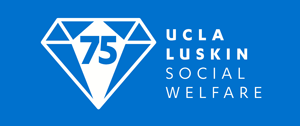By Stan Paul
Since 1947, Social Welfare at UCLA has been a leader in enhancing human well-being and promoting social and economic justice for disadvantaged populations.
 Social Welfare has much to celebrate after 75 years. Under the direction of Professor Laura Abrams, the current department chair, the department will be hosting celebratory events throughout the academic year, culminating with an on-campus gala May 6. Fittingly, the theme of the 75th anniversary celebration focuses on community engagement.
Social Welfare has much to celebrate after 75 years. Under the direction of Professor Laura Abrams, the current department chair, the department will be hosting celebratory events throughout the academic year, culminating with an on-campus gala May 6. Fittingly, the theme of the 75th anniversary celebration focuses on community engagement.
“That’s why I became a social worker, that’s why I came to UCLA, that’s why I stayed at UCLA, that’s what’s shaped me is the community engagement,” said Gerry Laviña, longtime director of the field faculty at UCLA Luskin.
Laviña, who plans to retire in 2023, reflected on his experience as a student, instructor, leader, mentor and social worker over 30 years.
“One of the things that I learned as an MSW student from the first year throughout my career and is what I told my first- and second-year students, you cannot do this work alone,” Laviña said. “That’s what field education is.”
Laviña said the department has survived and thrived because it has long emphasized field education through deep ties to community service agencies and an emphasis on community engagement.
“I was here for the 50th anniversary, which was really significant, and now I’m going to end at the 75th anniversary,” he said. “There’s been a lot of positive changes in our program, which is due to the hard work of a lot of us who’ve been committed to making it a better place.”
Professor Fernando Torres-Gil concurs.
“In just over 75 years, this program really moved up in terms of respect, recognition and visibility,” said Torres-Gil, who has filled a number of leadership roles over his three decades at UCLA.
Social Welfare is the oldest and largest of UCLA Luskin’s graduate degree programs in terms of student enrollment and number of faculty. Thousands of students have received their educations and training over the years.
“Our Social Welfare program is embedded in the multidisciplinary Luskin School that’s part of a university that truly believes in cross-disciplinary collaboration,” said Torres-Gil, referring to the decision in the 1990s to join Social Welfare, Urban Planning and Public Policy in a School of Public Affairs. “It’s stronger, more influential, more impactful precisely because it collaborates with its sister/brother departments.”
He said it’s been gratifying to see the department and School’s academic and professional reputation grow in recent years. “It has finally come of age, recognized nationally, even internationally, however you measure it.”
 Social Welfare has much to celebrate after 75 years. Under the direction of Professor Laura Abrams, the current department chair, the department will be hosting celebratory events throughout the academic year, culminating with an on-campus gala May 6. Fittingly, the theme of the 75th anniversary celebration focuses on community engagement.
Social Welfare has much to celebrate after 75 years. Under the direction of Professor Laura Abrams, the current department chair, the department will be hosting celebratory events throughout the academic year, culminating with an on-campus gala May 6. Fittingly, the theme of the 75th anniversary celebration focuses on community engagement.